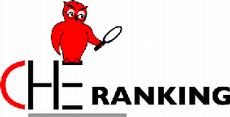Excellent ETH Zurich natural sciences
ETH Zurich occupies a first-class place in the first “CHE Ranking of Excellent European Graduate Programmes in Natural Sciences”. It is one of the few European higher education institutions to have received the “excellent” rating in Biology, Chemistry, Physics and Mathematics.
The “CHE Ranking of Excellent European Graduate Programmes” gives for the first time guidelines for graduates wanting to obtain further qualifications in Master programmes or doctoral programmes in the areas of Biology, Chemistry, Mathematics and Physics throughout Europe. In addition the Ranking, published on 5 December 2007 in the on-line portal of “Die Zeit”, also provides information about the research strengths of European institutions of higher education.
ETH Zurich is assessed as excellent mainly in relation to “hard facts” such as citations or publications in all four specialist fields. This ranks the institution equal with Cambridge University, the University of Utrecht and Imperial College London. These institutions achieved a place in the Excellence group in all four specialist areas examined. Furthermore, the Ranking stresses ETH Zurich’s constantly high proportion of international tutorial staff and international doctoral students.
The Ranking also records a diverging judgement by the students. For example they praise the four specialist areas of ETH Zurich for their good infrastructure, but some of them criticise the pastoral conditions, especially a lack of opportunities for contact with teaching staff and with other students.
Comparison of 250 higher education institutions
The Centre for Higher Education Development (CHE) considered several hundred European higher education institutions in its comparison. A preliminary selection based on four indicators such as number of publications, citations relative to the world standard, number of most frequently cited researchers and participations in the European Union’s Marie Curie program identified around 500 faculties in about 250 higher education institutions in 20 countries throughout Europe that displayed outstanding achievements in at least one of the criteria examined, for which they received a bronze, silver or gold medal.
120 higher education institutions were able to show at least one silver medal per faculty and thus belong to the top group. In turn, 25 of these 120 higher education institutions had one or more faculties that received at least three silver medals and thus belonged to the excellence group. They were analysed in more detail with regard to the learning and working conditions of their Master and doctoral students. Finally, only four higher education institutions succeeded in gaining an excellent placing in all four specialist areas.
In addition to the quantitative parameters, the Excellence Ranking includes an abundance of useful information about Master and doctoral programmes, research groups and specialisms at the faculty, as well as the accommodation availability and tuition fees. There is a plan to expand the Ranking to other subjects as well in the future.
Times Ranking: methodology changed again
In the
Times Higher Education Supplement Ranking 2007, published recently, ETH Zurich
is ranked 42nd. It still occupied 24th place in the previous year. When this
ranking was first established in 2004, ETH Zurich could still boast a place
among the world’s 10 best higher education institutions. All the other Swiss
universities together with the EPFL (Lausanne) have slipped down this year.
EPFL dropped from 64th to 117th place, the University of Zurich from 109th to
140th and the University of Geneva from 39th to 105th. However, ETH Zurich
remains among the best 20 in its core areas of Natural Sciences, Engineering
Sciences and IT Sciences. It is placed 18th in Natural Sciences and 13th in
Engineering and IT Sciences.
Critics of this year’s THES Ranking point to the changes in the methodology.
The assessment of citations and scientific publications has a large effect on
the ranking. Thus the authors of the ranking used the “Scopus” data base as a basis
instead of the ESI Index, and they referred to the last five years instead of
the past year. As an innovation, they calculated using full-time equivalents
instead of the head count for the faculty members, i.e. post-docs, assistant
professors and professors. The THES ranking and comments by ETH Zurich are
available at http://www.fc.ethz.ch/facts/ir/rankings/thes_ranking.








READER COMMENTS